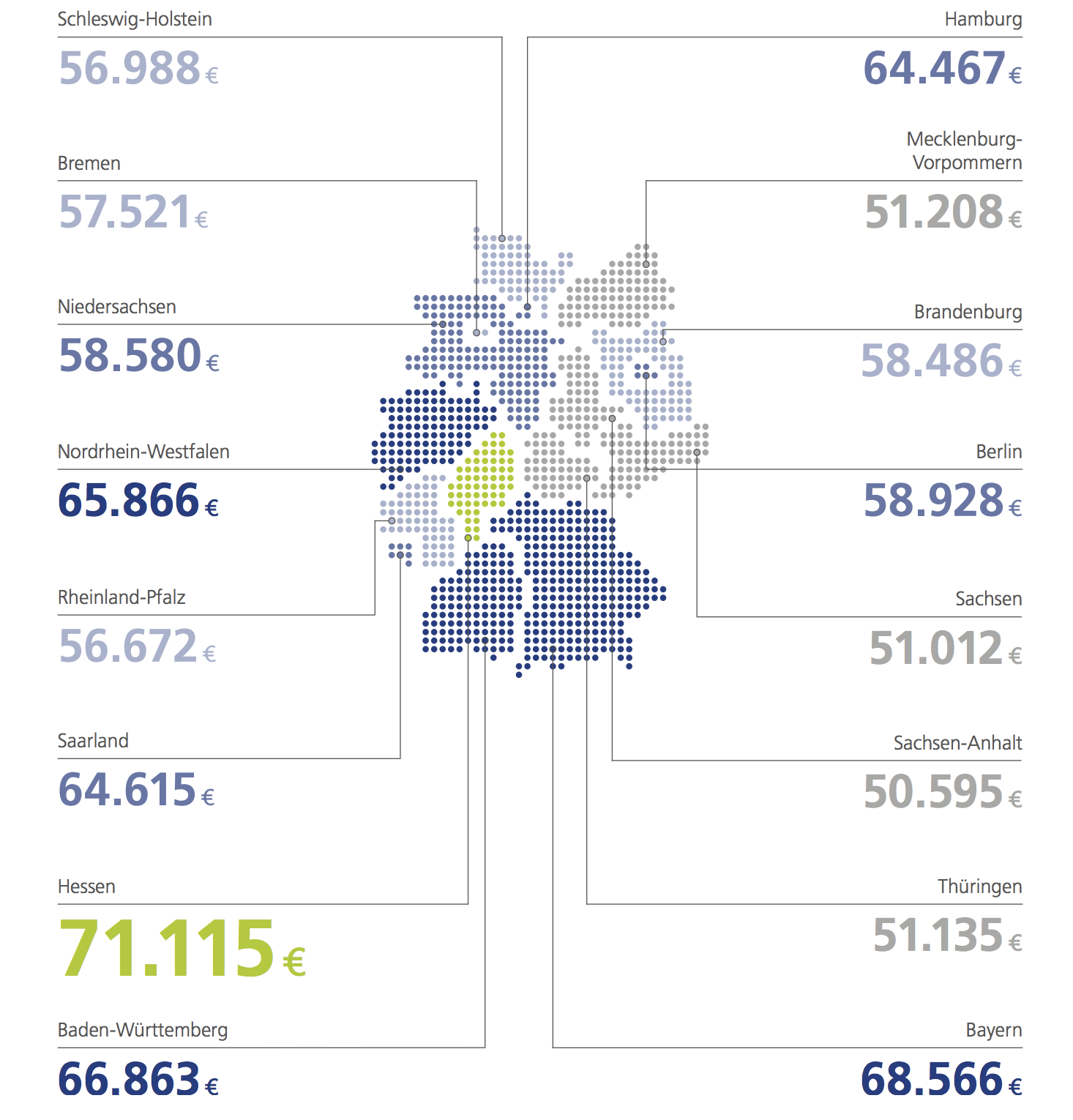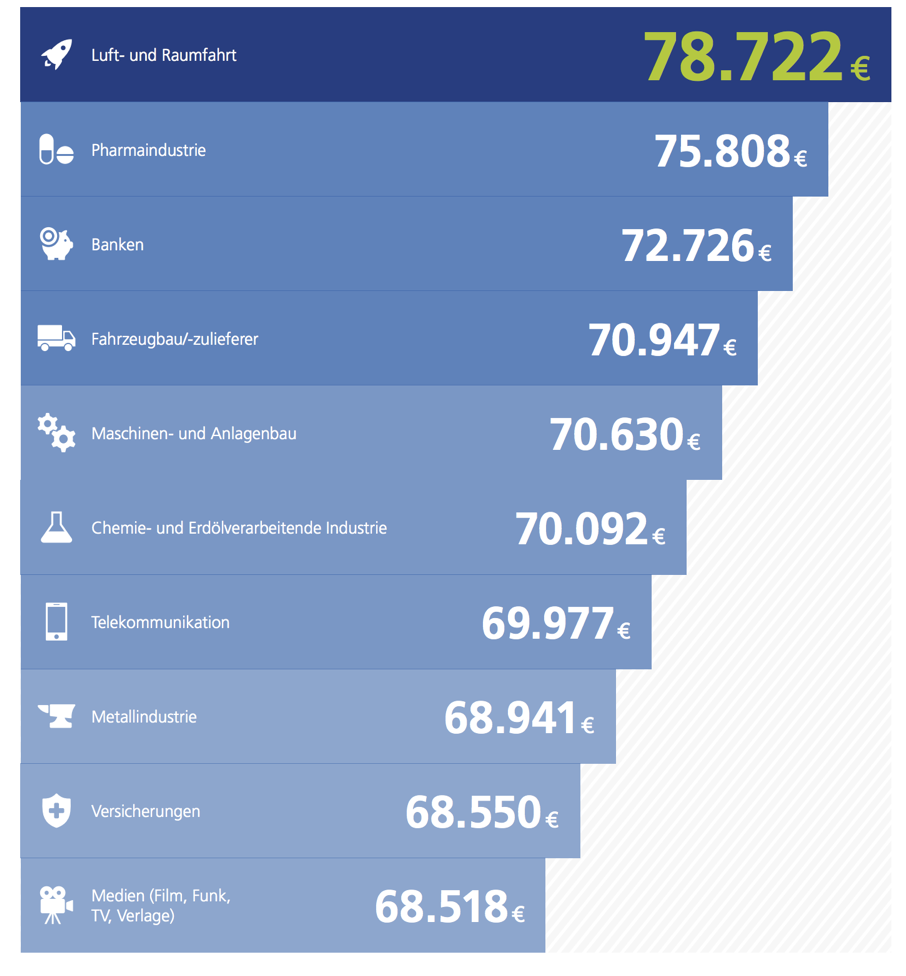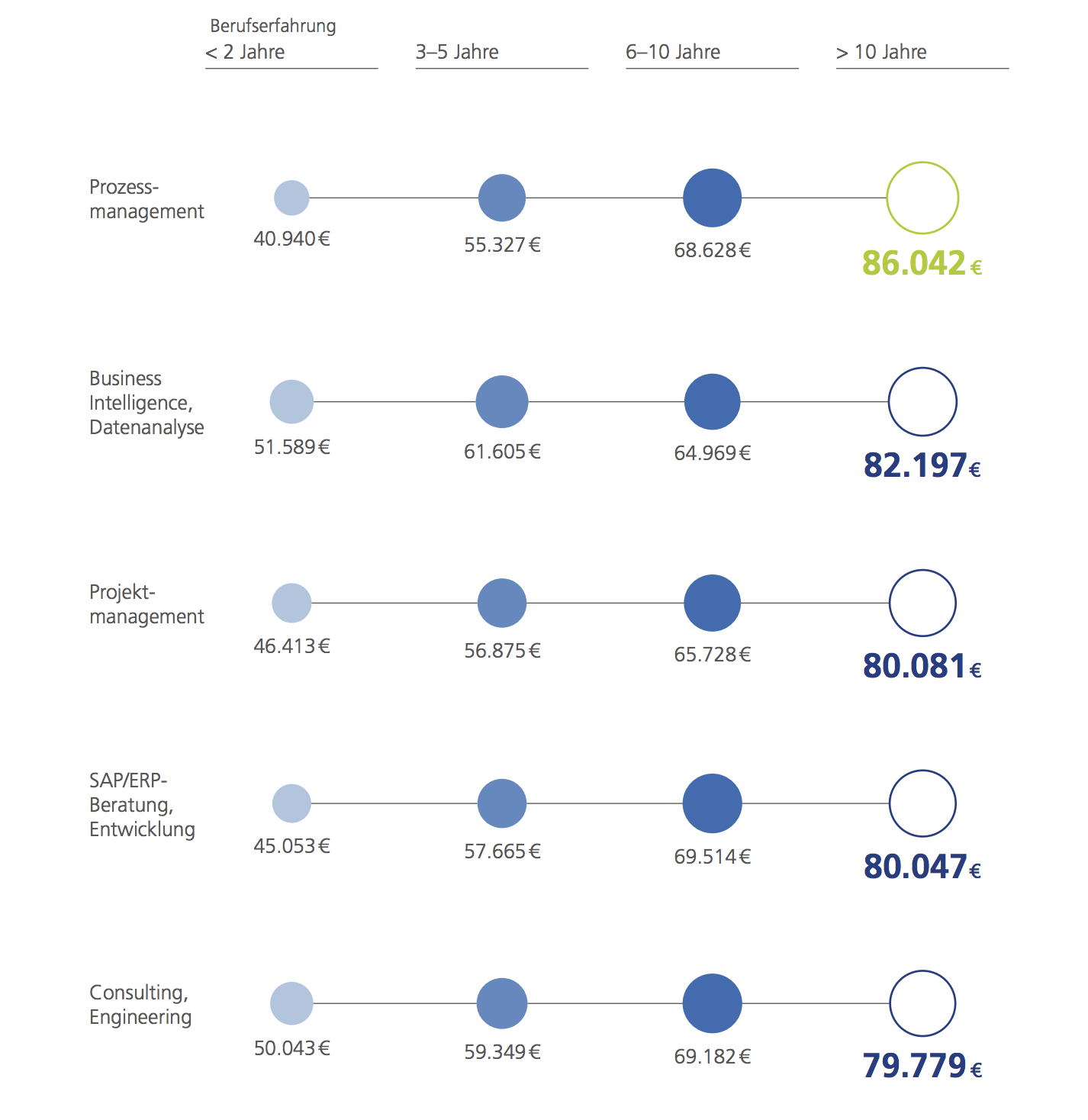How much do IT shniki earn in Germany
I am a recruiter in Munich and quite often I look for IT specialists with relocation to Germany and spend dozens of interviews with candidates from the post-Soviet space. The most common misconception that I encounter is, frankly, overstated salary expectations.
Applicants cite such numbers that I, as a recruiter, have met in the real world several times in my life. I decided to collect information from open sources on the German-language Internet on the level of payment and add my comments on the actual experience of hiring IT specialists from the CIS countries.
If you have a different experience and you really earn more, share in the comments where :)
Salary in Germany will vary greatly depending on the land, skill level and demand for competencies.
The IT industry is the second largest in Germany, employing 710,000 people (according to Robert Bosch). At the same time, in 2018 43% more positions were published than 4 years ago (data from StepStone).
The largest number of positions was published for Hamburg, Berlin and Bremen. Bavaria also showed fairly high numbers.
With an acute shortage of personnel, companies are willing to pay higher and “re-buy” specialists. For you, this means that once you are in Germany, your chances of getting a new, better paid job increase dramatically.
At the same time, the patches as a whole do not grow much, but are stable. Over the past year, growth has averaged 2.1% (with an inflation rate of 1.8%) .
Most programmers in hiring are full stack.
The most popular technologies:
• Cloud (AWS, Google, Azure)
• MySQL, CSS, Javascript and HTML
• Java (96 thousand developers)
• Docker
• Kubernetes
• Python (91 thousand specialists)
• PHP / C # / C ++ / Ruby
• DevOps (experience in Cloud)
• RPA
• Data Science / Big Data / AI
• ML
• BI
Portrait of an average programmer
• 25-29 years old
• man
• about 6.5 years of programming experience
• average earnings: 56–93 thousand euro per year.
I know a big swing. Let's figure out how much to whom.
Portal StepStone calls a more accurate figure - 64.837 euros per year.
At the same time, the level of education plays a significant difference. A degree in Computer Science brings in 10 thousand euros more than a secondary special education (a common type for IT professionals in Germany).
It is interesting to note that there is a significant wage difference for men and women (the latter earn up to 10% less with similar competencies)
With management experience you can get up to 28% more.
Very strong difference in land.

Mecklenburg Pomerania earns the least (on average, 50 thousand euros per year), while the highest salaries are promised in Hesse, Baden Württemberg and Bavaria (67 thousand on average)
It is worth to make a reservation! This is the AVERAGE value, i.e. there are executives who earn well above 100 thousand and juniors who start from 30-40 k! (At the same time with a good diploma, knowledge of English and German, working in a large company, you will start building a career with the figure of 55 thousand.)
An important factor in the difference in salaries is also the industry in which IT managers work. When performing the same functionality, the salary difference can be up to 10 thousand euros per year.

What else affects the level of wages?
Company size (giants pay significantly higher than start-ups and medium-sized businesses)
An important factor is specialization and experience.

The most popular specializations in 2018
Project managers on
average earn about 80 thousand a yearSAP Consultants
On average, at the hospital, such specialists earn around 65.800 euros per year. At the same time, with experience, the salary also grows (the difference between the junior and the senior will be about 15%). A more realistic figure, in my opinion, is approaching 72-75 thousand per year. This is the highest paid category today. If you work for yourself (a freelancer or a registered own enterprise), then you really earn about 120 thousand per year.IT consultants
64.200 euros per year. Here an important role is played by the experience of project and people management. The difference in salary can be up to 35% and grow up to 74.500 euros.
In Munich (in my opinion) the more real figure is 80-90 thousand.Software developers
The average salary is approximately 57.700 per year. A significant difference in industry, engineering and the automotive industry pay an average of 10% higher. In Backend, the average figure is slightly higher, 58.300 euros. Specialists in the User Experience get a little lower - 55.000 Euro.
This clearly shows the desire of specialists to earn more, but the reluctance of employers to pay more. Usually, “trade” in Munich stops somewhere at around 60-65 thousand. Above, it happens either with good German or with a very narrow specialist profile.
There are candidates who manage to find a job with a salary much higher. But this is an exception to the rule.
JavaEE developers get more salaries, because of just less in the market, and many fintech companies work on JavaEE. But even here there are not transcendental figures: 65-80 thousand a year.
Mobile application developers can count on 56.300

- System administrators
can expect to 47.600. Maximum 52.700 per year. In the presence of VO salary growth will be approximately 13%. I know people who get 70 thousand a year at this position, but this is not the rule. This is an exception.
The level of education significantly affects the payment.
If there is a degree, the payment will be higher than 75 thousand (often reaches 90). A university diploma and from 5 years of experience in a particular field practically guarantees a salary above 70 thousand. Initial salaries for young specialists start somewhere around 45-50 thousand.
It is important whether the company works on the tariff scale or not.
Almost all the major players in the market work in the tariff. Accordingly, employees receive a fixed salary. The difference (significant) will be only in the level at which you are (determined mainly by the duration of the experience in general and membership in the company). Details here and here .
Thus, the difference between the levels at the same position can vary from 2,400 euros per month to 5,800 gross.
What is important to consider?
The tariff considers the working week 35 hours. That is, if you work 40 hours a week, the salary will be automatically higher (in proportion to the time under the contract). Processing will be automatically paid separately. It turns out that your real annual salary will be higher than indicated in the tariff!
Plus, do not forget about the buns that you can pay the employer (can reach up to 40% of the official salary).
What are some buns?
- Weihnachtsgeld is practically the 13th salary by Christmas. Can be from 30 to 100%
- Urlaubsgeld - another salary to leave. By the way, vacation can be 30 working days per year (6 weeks)
- Travel compensation (public transport or car + petrol for personal needs) from 100 to 300 euros per month. average
- Compensation of housing (relevant when moving. Acts for the first time) about 1000-2000 euros per month.
- Add. honey. insurance. can be up to several hundred euros per month in terms of net equivalent
- Add. pension insurance
- Computer / telephone (including for personal use, which is not a matter of course). About 50-100 euros per month.
How much will you actually get your hands on?
This is the most interesting topic. How much you get on your hands nobody knows. It very much depends on a number of factors: your marital status, your religion, your expenses, your spouse's earnings (and whether he is there), whether children go to school or garden, whether you have a nanny and a worker at home, whether you go to work by car, whether it is a corporate car and whether you pay for gasoline, how far you live from work, etc. On the one hand, you can always calculate approximately using a simple calculator . On the other hand, at the end of the year you will submit a tax return, on which you can significantly save and significantly increase your real income.
Let's look at two scenarios.
- male, 30 years old, single, no children, atheist, lives in Berlin. Salary is 60,000 gross per year.
Really on hands will receive 2933 a month or 35203 a year - man, 30 years old, married, wife does not work, 2 children, lives in Munich. Salary is 60,000 gross per year.
On hand will receive 3373 per month + (!) Kindergeld, about 400 euros per month. Those. 45285 euros per year.
Those. real wage difference will be 10 thousand euros per year. By playing around with the tax deduction, you can save even more. Here I will note that processing is paid separately. Can pay extra Christmas and vacation money. Bonuses and bonuses can be included, which brings from 2 to 10 monthly salaries. What is rarely taken into account by our compatriots.
Do not forget that when you work in Germany, you automatically receive full medical insurance coverage for you and your family.
